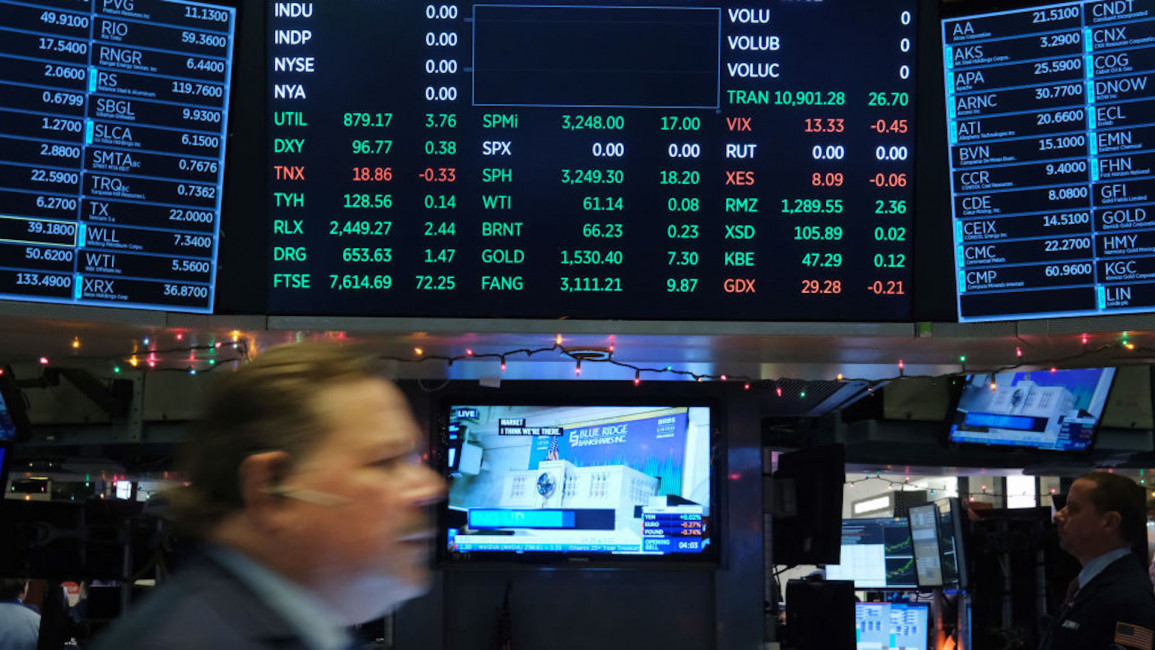Oil prices soar, stocks fall after deadly US strike in Iraq fuels war fears
European stocks also fell at the open on Friday, with investors rattled after the US strike.
"Reversing Thursday's New Year bounce, the markets were uniformly in the red on Friday after the US killed the hugely influential Iranian general Qasem Soleimani," said Spreadex analyst Connor Campbell.
Read more: US killing of top Iran general Soleimani sparks global fears
Global stock markets had powered ahead on Thursday as investors welcomed 2020 with a raft of gains after China's central bank announced fresh stimulus, but the recent political turmoil has turned the tide of the markets.
The head of Iran's Quds Force, Qassem Soleimani, was hit in an attack on Baghdad's international airport early Friday, according to Hashd al-Shaabi, a powerful Iraqi paramilitary force linked to Tehran.
Later, Donald Trump tweeted a picture of the American flag, and the Pentagon said he had ordered Soleimani's killing.
Iran's supreme leader Ayatollah Ali Khamenei warned of "severe revenge" for "the criminals who bloodied their foul hands with his blood", while the country's foreign minister called the move a "dangerous escalation".
Brent surged 4.4 percent to $69.16 and WTI jumped 4.3 percent to $63.84 as investors grow increasingly worried about the effects of a possible flare-up in the tinderbox Middle East on supplies of the commodity. Both oil contracts later pared the gains but remained well up.
Twitter Post
|
In early European trade London fell 0.5 percent, Paris lost 0.6 percent and Frankfurt retreated 0.8 percent.
In initial trade, London's benchmark FTSE 100 index of major blue-chip companies reversed 0.3 percent to 7,578.79 points.
In the eurozone, Frankfurt's DAX 30 index slipped 0.9 percent 13,267.38 points and the Paris CAC 40 shed 0.6 percent to 6,014.18 compared with the close on Thursday.
Stocks also fell broadly on Wall Street in early trading on Friday.
"This is more than just bloodying Iran's nose," said AxiTrader's Stephen Innes. "This is an aggressive show of force and an outright provocation that could trigger another Middle East war."
The killing of Soleimani is a dramatic escalation of tensions between the United States and Iran and comes after a pro-Iran mob this week laid siege to the US embassy in Iraq following deadly American air strikes on the hardline Hashd faction.
The attack on the embassy highlighted new strains in the US-Iraqi relationship, which officials from both countries have described to AFP as the "coldest" in years.
Cailin Birch, global economist at The Economist Intelligence Unit, said the market feared a "broader conflict".
"The importance stems less from the potential loss of Iranian oil supplies ... and more from the risk that this could spark a broader conflict that draws in Iraq, Saudi Arabia and others," she told AFP.
"There is also a significant risk that Iran could launch a targeted attack on US ships in the region, which could disrupt seaborne crude oil flows and cause prices to rise further."
Oil prices saw a record surge in September after attacks on two Saudi Arabian facilities briefly slashed output in the world's top exporter by half, with Trump blaming Iran for the attack and previous other blasts on tankers in the Gulf last year.
Markets had all been well up before news of the strike, thanks to ongoing optimism fuelled by the China-US trade agreement, looser central bank monetary policies and easing Brexit worries.
"Investors are worried that the situation in Iran will worsen, since there could be some retaliation," said Steven Leung at Mizuho Bank.
"People will want to cut risk ahead of the weekend. Stocks have rallied a lot in the past month or so, so any bad news flow is a reason to take profit."
Follow us on Twitter and Instagram to stay connected



